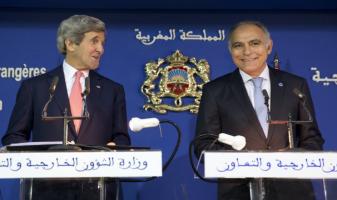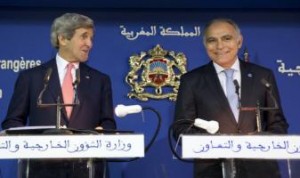Commentary Magazine
Michael Rubin
On Thursday, Secretary of State John Kerry and Moroccan Foreign Minister Salaheddine Mezouar will sit down to begin the third bilateral U.S.-Morocco Strategic Dialogue. I’ve written frequently about Morocco here at COMMENTARY because it’s important to recognize success in the Arab world. While across the Middle East, North Africa, and the Sahel, many states are teetering, Morocco—like Israel, Oman, the United Arab Emirates, and perhaps Tunisia—is a rare success. It has not only been a consistent U.S. ally in a world increasingly devoid of them, but it has also pushed itself front and center on efforts to counter violent extremism.
After some low points during the reign of King Hassan II, under the current king, Mohammed VI, human rights have markedly improved and press freedom is also improving. That does not mean Morocco is perfect; no country is.
Corruption remains a problem which inhibits business, and police abuse is also a problem for those in detention. Still, a quick comparison between Morocco and pretty much every other state shows just how valuable bilateral relations are. And Morocco is taking its democratic empowerment to new heights with its new autonomy plan to devolve real power down to a more local level in the Western Sahara among other regions.
It is time to close the file on the Western Sahara dispute, a manufactured grievance with its roots in Cold War politics. If there is one thing that the last two decades have made clear, is that the United States cannot take stability for granted in the Islamic world and Africa; filling vacuums is a U.S. interest. When a vacuum can be filled with a stable, moderate government with a proven and sincere record as an aspiring democracy, that is even better.
At the same time, however, as much as Moroccans and fans of a strong U.S.-Moroccan bilateral relationship would like, no administration in Washington is going to focus as much energy on bilateral ties as would be possible in an ideal world. With civil wars in Syria, Libya, and Yemen; renewed Russian bellicosity; drug gangs running rampant in Mexico; the Iran nuclear deal; and a rising China, Morocco is always going to be on the backburner, condemned by its own success.
This is why it should be the policy of the United States to encourage direct, private investment throughout Morocco and the Western Sahara. Algeria may dispute Moroccan sovereignty over the territory, but there are few merits to Algeria’s claim; rather, European Union auditors have shown that Algeria simply treats the Sahrawi refugee issue as a cash cow. There is nothing in U.S. law that prevents direct foreign investment in the Western Sahara. U.S. diplomats and commercial officers based in Rabat should travel to the region, show American businessmen the ample opportunities available, and help aspiring investors navigate Morocco’s bureaucracy.
Providing employment will help cement stability, and greater foreign investment will encourage transparency and financial reform. That will be good both for U.S. jobs and business, and support U.S. national-security issues.
It’s seldom the United States gets an opportunity to do so much right with so little effort. Let us hope that the Strategic Dialogue can be the occasion that pushes Washington to replace its 20th century policy with one designed for the new century.








